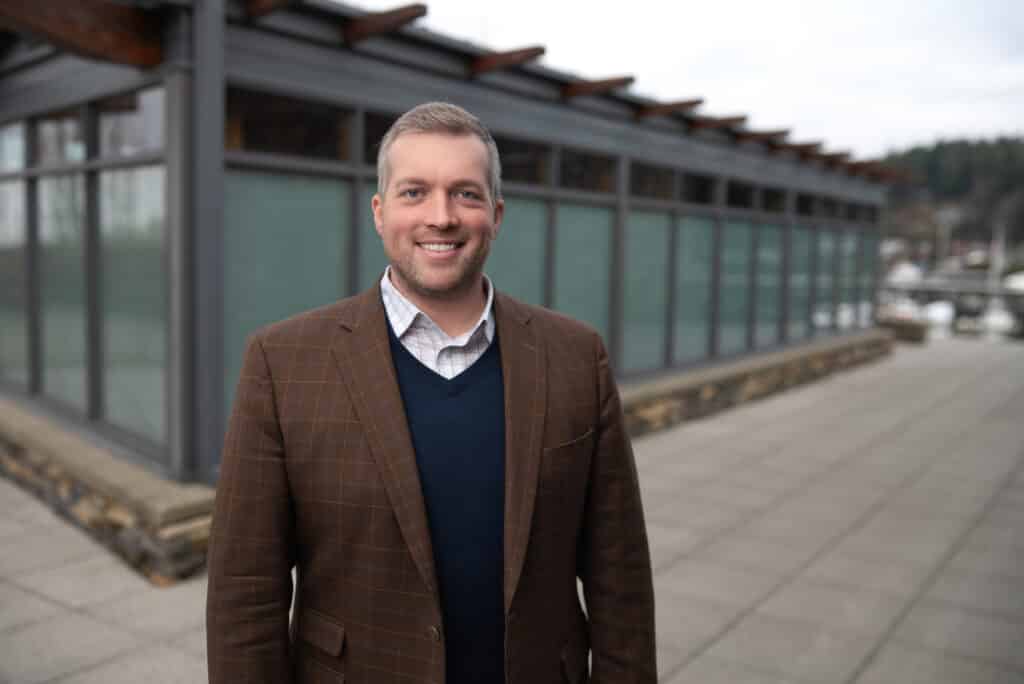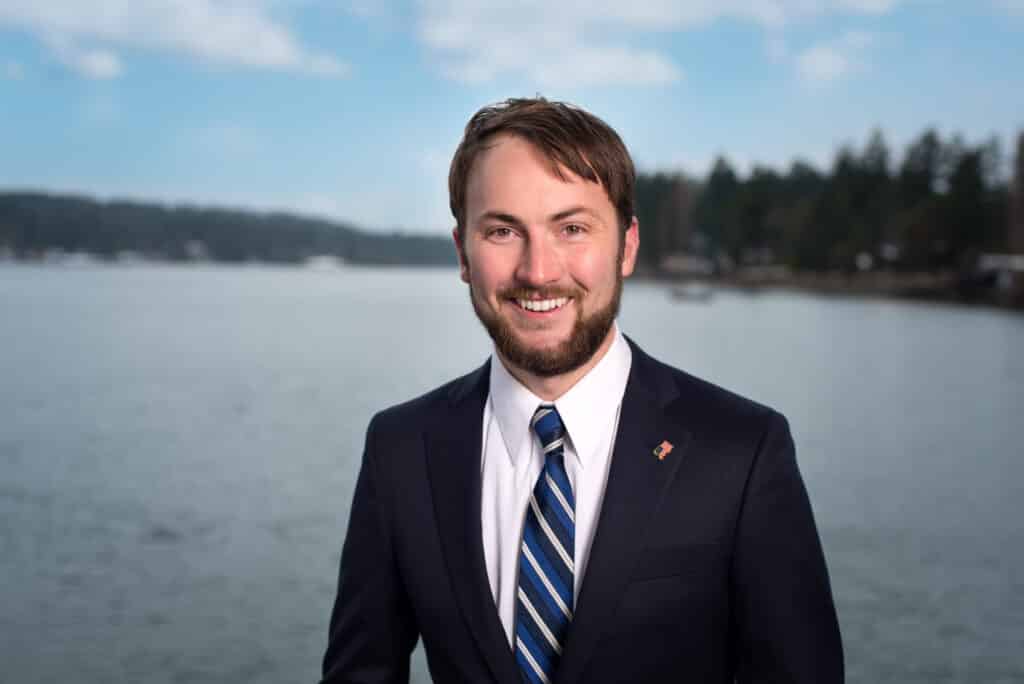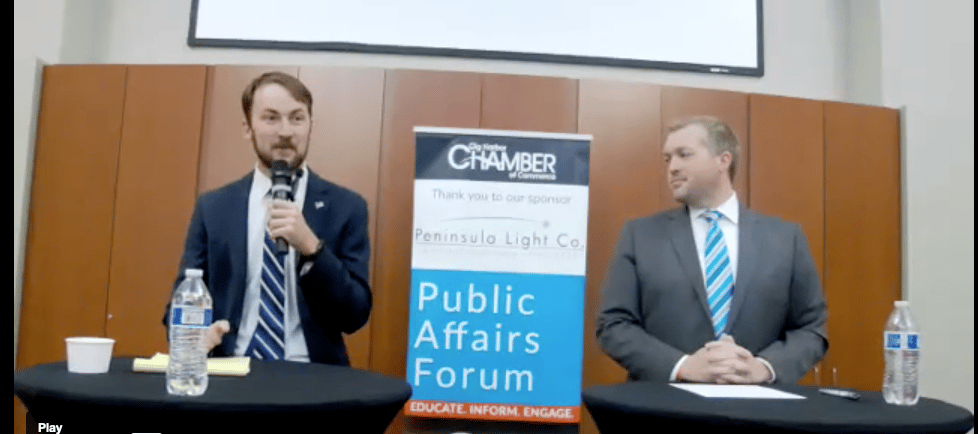Community Government
Election profile: Hutchins vs. Richards for state House
Democrat Adison Richards and Republican Spencer Hutchins both have deep ties to Gig Harbor and both want to represent the 26th Legislative District in the state House. But unlike in many other races, they agree on a lot of things.
They have similar views on housing, education, the economy and other important issues. But their ideas for solutions are often different.
Hutchins, who works in real estate, served for two years on the Gig Harbor City Council. His said he wants to bring balance to the Legislature.

Spencer Hutchins Courtesy photo
“Washington state has been governed by a single party for many years and we need to bring balance,” he said in a phone interview. “We’re one vote away from (Democrats) being a super majority in Olympia. When the numbers are closer, both parties have a better opportunity to sit down and talk to each other and work out common solutions.”
Richards says that his experience as an attorney “working with people who’re just trying to make ends meet” and “being a voice for the people in our community who get overlooked in Olympia” make him the best choice to represent “the 26th District.

“I love this community and I’ll work with anyone who has good ideas for solving our problems — no matter where they stand politically,” Richards said.
The 26th District includes Gig Harbor, Purdy, the Key Peninsula, southern Kitsap County, Port Orchard and part of Bremerton. Hutchins and Richards are running for the seat being vacated by Republican Rep. Jesse Young, who gave up his seat to run for Senate.
The Pierce County Auditor’s Office mailed ballots to voters in mid-October. All ballots must be returned by Nov. 8.
Question & answer
Gig Harbor Now asked both candidates for written responses to five questions covering public safety, transportation, education, climate change and the economy. There responses are printed verbatim below:

Adison Richards, left, and Spencer Hutchins at a Gig Harbor Chamber of Commerce Public Affairs Forum debate in September.
Public safety
The 2021 Blake Decision effectively ruled the state’s felony drug possession laws unconstitutional. Subsequent legislation made drug possession a misdemeanor, but required people to be offered treatment for their first two offenses. What changes in drug possession laws and enforcement would you support in the Legislature?
Hutchins: The legislature’s response to the Blake decision is a scandalous failure. The state Supreme Court invalidated Washington’s felony drug possession laws because they did not contain a “mental state” component. The legislature needed only to add the words “knowingly possess” to our existing drug laws to satisfy the Blake decision. Instead, the majority party downgraded drug possession to a misdemeanor and did not permit prosecutions until the third offense. Worse still, they created no statewide database for tracking drug possession offenses. And now police have virtually no effective way of enforcing drug laws. We face a bizarre reality today in which a minor leaving their house with alcohol will be charged with minor in possession. The same minor leaving the house with fentanyl will be charged with nothing. That is wrong, totally irresponsible, and reckless. I would support a return to felony possession with the inclusion of the required mental state component. And I would strongly advocate for a more robust treatment option instead of incarceration.
Richards: As an attorney serving crime victims, I take public safety seriously and come to this discussion with experience and respect for law enforcement. I support adding the word “knowingly” back to the statute and making possession of drugs like fentanyl, meth, and heroin felonies. I agree with what Chief Busey wrote in an op-ed on this issue a few months ago where he called for that change. He also asked us to reimagine incarceration for those addicted, improve drug courts, and have civility in this discussion, all of which I support. We need effective treatment for those who are addicted and cannot leave people on the side of the road. We can and should use the law to compel people to seek the treatment they need and that will be good for our community too.
Transportation
What would be your top transportation priority in the 2023 and 2024 legislative sessions?
Richards: Having lived in the Gig Harbor area my whole life, we need a solution for Wollochet soon. It’s so dangerous, especially for cars like mine that go from 0-60 in 60 seconds. There’s a wreck there every 10 days, which puts a lot of strain on our first responders and traffic.
Because our district has so many overdue transportation needs, I’m going to cheat and add two more: finding additional money for a solution to the Fox Island Bridge and continuing to lower Narrows Bridge Tolls. The Narrows Bridge is the worst funded project in State history. Most of our payments are going to hedge funds for debt service and it’s an irresponsible use of our money. I also don’t want to see folks on Fox Island paying steep tolls either because Pierce County blames people for living on an island that Pierce County built a bridge to.
Hutchins: My top transportation priority is to ensure that transportation-related revenues are directed into the state transportation budget. We have serious infrastructure needs that are not adequately funded because revenues such as sales tax on vehicles and transportation projects go into the general fund rather than the transportation budget. Additionally, spending on projects that are not directly transportation-related such as bike paths and environmental improvements should not be paid through the transportation budget. We need to increase the dollars for vital infrastructure improvements in the transportation budget and make sure our spending is allocated to high-intensity transportation needs—such as improvements to Highway 302, the Wollochet interchange, and the Gorst interchange.
Education
After the Legislature approved a 5.5 percent cost of living adjustment for teachers this year, are teachers and other school staff making the right amount of money? Should teachers and other school staff be paid more to attract and retain the best candidates?
Hutchins: Funding for education in Washington State has increased at a remarkable rate. Per-pupil funding and educator salaries have gone up substantially. What is demoralizing is that as we increase teacher pay, the state government’s unconscionable contribution to the harmful effects of inflation diminishes the benefits of such increases. Our cost of living is outpacing wages across the board. Washington’s increased taxes, fees, and regulations are driving up costs everywhere. The state needs to do everything it can to bring our cost of living down so that teacher salaries will ensure a reasonable quality of life. I am committed to doing all I can to improve our cost of living as your State Representative.
Richards: Education is the paramount duty of the State and we need to support our public schools and our educators. My mom taught at Peninsula where I graduated from, and I now coach cross country in my spare time. Family members went to Gig Harbor and I love our schools. We’re seeing workforce shortages in many fields, and education is one of them, in part due to the challenge of offering competitive pay. The educators I know are pleased to have finally received a raise and cost of living adjustment. But we have a long way to go to make sure our school districts and students don’t fall behind better resourced districts like those in Bellevue and Mercer Island.
Climate
Do you support recent steps to reduce greenhouse gas emissions, such as the state’s “cap-and-invest” initiative, and the 2030 target to phase out sales of new gasoline-powered cars?
Richards: I grew up swimming in Puget Sound and worked at a local seafood restaurant while in law school, so when Puget Sound’s surface hit nearly 80 degrees last summer, I knew it was devastating for our economy and way of life. We have to lower emissions and Washington is relatively close to having an energy supply that does not rely on fossil fuels. I don’t support one size fits all models to get there. We have to make it affordable for people to make the transition to clean energy and update the grid. Simply passing regulations saying we can’t sell gas powered cars in the future won’t get us there. If elected, I’ll make sure that any impact on the cost of diesel because of cap and invest is immediately addressed so that it doesn’t result in an increase in the cost of fuel. We should work on a jobs and energy program that makes it affordable to do things like install panels and get new cars. We can do so through our local schools and businesses with the goals of creating jobs, making us energy independent, and reducing energy costs to address affordability.
Hutchins: We must protect our environment. Anyone who lives in this beautiful part of the world knows that we are stewards of a precious gift that we must preserve for the future. At the same time, we have to balance the costs against the benefits of any policy proposals. I oppose the state’s cap and trade program because the benefits of such a state-specific program for the global climate are infinitesimally small compared to the outsized harmful effects on our local economy. At a time when crippling inflation is hurting hardworking people, these programs along with the wholesale replacement of fuel vehicles with electric, will inevitably make things worse by driving up the price of energy, food, and other essential goods. We need to work on market-based solutions that work for everyone rather than one-size-fits-all Olympia cramdowns.
Economy
What can the state do to ease the impact of inflation?
Richards: I’ve used my law degree to serve people who are struggling to make ends meet and I know the State can make changes to help ease the cost of living. We should increase the supply of housing, child care, health care, and long-term care. For example, one of the reasons the cost of housing is way up is because Washington ranks last in the country in the supply of available housing per person. We need to change zoning laws and the Growth Management Act to make cities like Seattle act like big cities. We should make more improvements to our supply chain to keep goods and services moving. I support growing wages, not taxes. We should reduce taxes for small businesses, like my dad’s, as well for homeowners by increasing the senior property tax exemption. Inflation is a global problem, but there are practical market-based solutions the legislature can pass now to help us through this time and create a path to success going forward.
Hutchins: Decades of single-party control in Olympia has led to a cost of living crisis in Washington. If we expect change, we need bipartisan collaboration in Olympia, not a single-party supermajority. The two caucuses have to talk to each other more, not less. We must pull back on costly programs like cap and trade and California-style low carbon fuel standards which are driving up the price of gas and increasing inflation on all goods. We must reverse years of built up regulations and fees that artificially add 30-40% to building costs in Washington and make affordable housing a vanishing possibility for far too many. We must push back on rising taxes and new taxes like the capital gains income tax and the long-term care tax that are both ineffective and make it more difficult to live, work, house, and employ people in our state. As a State Representative, I am determined to stop the state’s recklessness that is piling on to the already onerous burdens of inflation.

